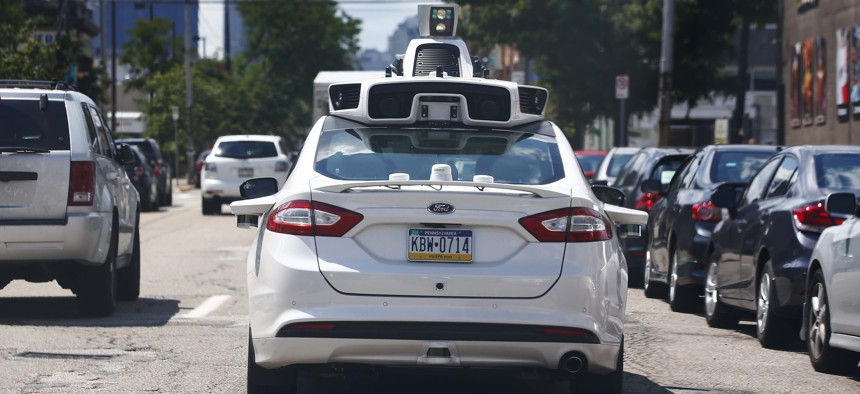Connecting state and local government leaders
“I urge you to enlist cities as partners,” transportation commissioner Polly Trottenberg told Senate lawmakers.
WASHINGTON — New York City’s top transportation official says cities are getting left out of federal efforts to prepare for the rise of self-driving cars and trucks on the nation’s roadways.
Polly Trottenberg, commissioner of the city’s department of transportation, told the Senate Environment and Public Works Committee on Wednesday that, to date, the feds have not “meaningfully involved” cities in developing policies for the vehicles.
“I urge you to enlist cities as partners,” she added.
Trottenberg specifically called for the U.S. Department of Transportation and the National Highway Traffic Safety Administration to engage with cities more directly going forward.
The transportation chief made her comments during a committee hearing focused on how autonomous vehicle technology will affect the nation’s roads and bridges.
“This is a big part of the whole discussion of surface transportation infrastructure. What really are the needs?” said Sen. John Barrasso, the Wyoming Republican who chairs the committee.
“Not just what are the needs today to deal with maintenance that has been backlogged but then to prepare for the future and a future where things are going to be very different,” he added.
Last September, the House passed legislation meant to provide a national framework for automated vehicles.
A similar bill, the AV START Act, is pending in the Senate, where it’s been held up by a group of Democrats with concerns about safety, preemption of state and local laws, and other issues.
Meanwhile, the U.S. Department of Transportation is working on updated automated vehicle guidance, and is also holding a series of events around the U.S. to discuss the vehicles.
Proponents of self-driving cars and trucks cite possible benefits, such as cutting down on crashes, emissions and traffic jams. But others have flagged potential problems, like whether the vehicles could cause more people to travel by car and, in turn, worsen pollution and street congestion.
The technology drew negative attention in March when a self-driving Volvo sport utility vehicle operated by Uber, with a human backup driver, struck and killed a pedestrian in Tempe, Arizona.
“It’s a future paradise, or a horrifying future dystopia. We don’t know yet,” Trottenberg told Barrasso after the hearing, in a brief exchange about what automated vehicles could mean for cities.
Bill Panos, director of the Wyoming Department of Transportation, also appeared before the committee. His comments and written remarks highlighted some of the uncertainty state transportation agencies continue to face as they anticipate automated vehicles.
For instance: How will the vehicles navigate highway work zones? And how crucial are signs and lane striping for the safe operation of cars and trucks guided by computer technology?
Questions about highway striping can hinge on issues like whether a four-inch-wide stripe or a six-inch-wide stripe is better detected by a vehicle sensor. But Panos said in his written comments that “it is not clear how critical lane striping is” for automated vehicles.
“Infrastructure owners and operators want more information from the automakers about what infrastructure elements they need in order to be successful,” he added.
Shailen Bhatt, president and CEO of the group Intelligent Transportation Society of America, said during the hearing that “striping is a big deal” for automated vehicles.
Bhatt is the former executive director of Colorado’s transportation department.
In Colorado, snow plows can scrape away road striping. But Bhatt cited a stretch of highway where the state has embedded LED lights that can withstand plows into the pavement to serve as lane markings. He said he’s also talked to companies seeking to offer lane markings with small “RFID” chips that emit a signal vehicles would be able to detect.
Bhatt pointed out, however, that money for road markings and signs often comes from state transportation maintenance budgets.
“If you’re going to increase your maintenance budget, that’s going to obviously impact your construction budget,” he added. “The manufacturers need to make sure that they are factoring in the fact that many roads won’t be able to be upgraded, given the budget challenges.”
Trottenberg rejected the idea that cities need to “get their infrastructure ready” for the deployment of emerging vehicle technology. “I would argue just the opposite,” she said
The vehicles, in her view, should be able to operate safely on streets with pedestrians overflowing into parking lanes, bad pavement, faded markings and other complex conditions.
“It’s simply not realistic or feasible to expect cities to overhaul their existing roadway infrastructure to accommodate a still somewhat unproven technology," Trottenberg said.
Bill Lucia is a Senior Reporter for Government Executive's Route Fifty and is based in Washington, D.C.

NEXT STORY: OMB drafts 'Cloud Smart' strategy




